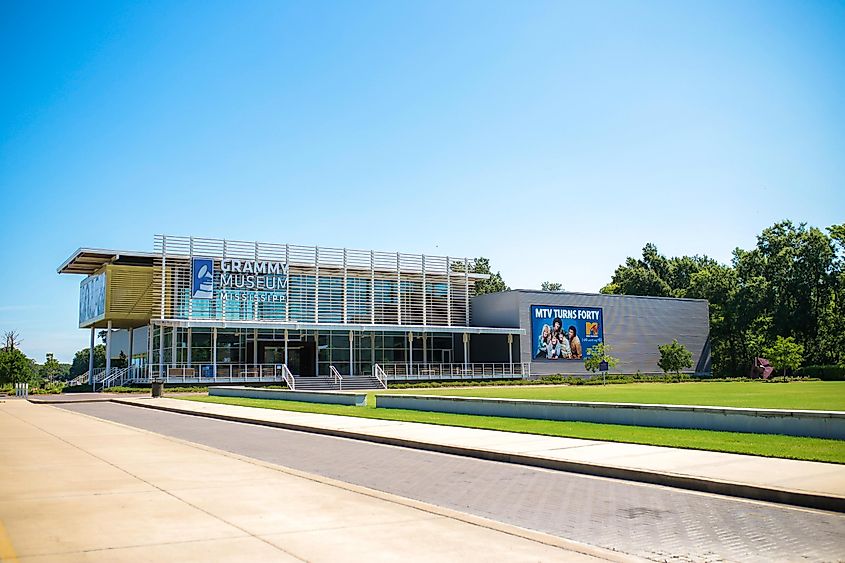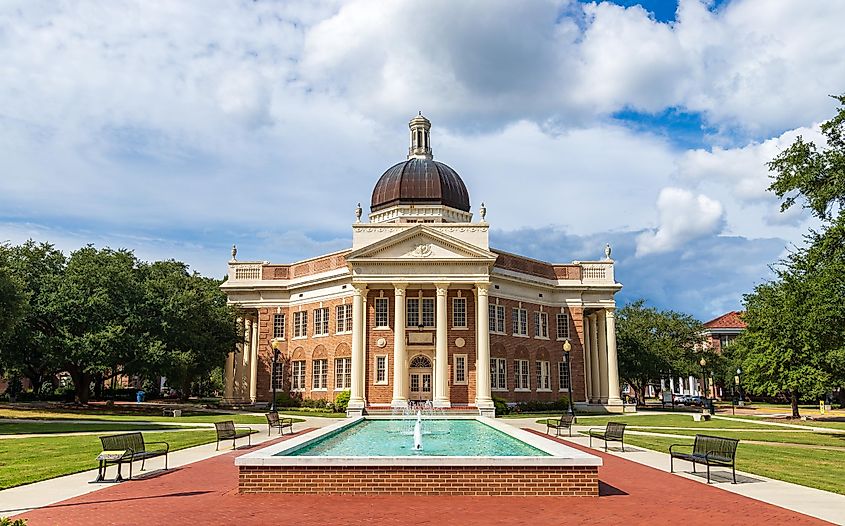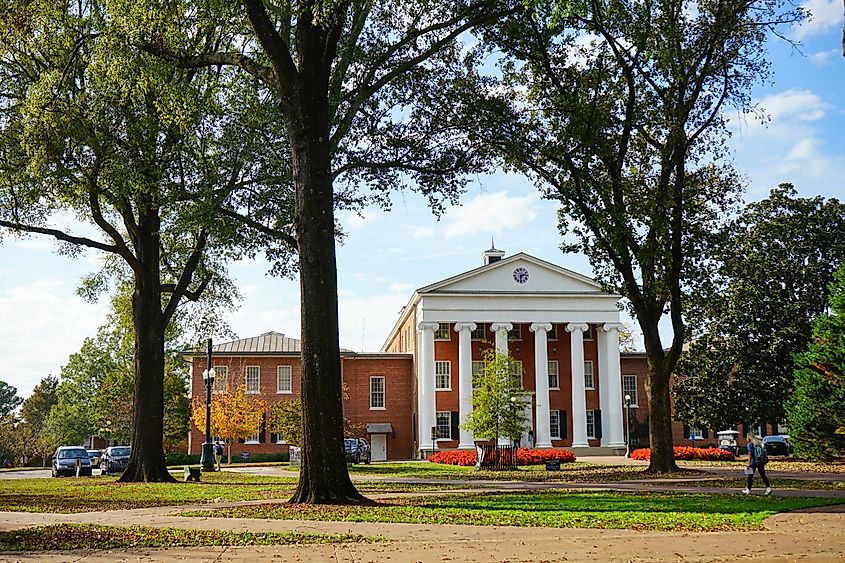
9 of the Most Welcoming Towns in Mississippi
Mississippi, called the Magnolia State after its state flower, is divided into two regions. The Gulf Coastal Plain covers most of the state, while the Mississippi Delta covers the northwest portion. Music fans will find particular interest in Mississippi. The state that gave us Elvis Presley is also home to the Mississippi Blues Trail, which includes sites such as train depots, churches, cemeteries, and cotton fields. Mississippi is also known as a hospitality state, and it has many welcoming small towns to enchant visitors.
Biloxi

Biloxi, Mississippi, sits along the state's southern coast on the Gulf of Mexico. Plenty of water excursions, such as deep-sea fishing, sailing, and paddle sports, await visitors. Casinos are a large part of Biloxi's tourism, and the Beau Rivage Resort & Casino and the Palace Casino Resort are two of the most popular. The town's vicinity to the gulf makes it a top spot for seafood, and Mary Mahoney's has been serving dishes like shrimp, crab claws, and her famous bread pudding for three generations.
Local events include live music, festivals like the Annual Gulf Coast Oyster Cook-Off & Festival, and Mardi Gras events. For those interested in learning more about Mardi Gras, the Coastal Mississippi Mardi Gras Museum offers a closer look at the colorful celebration.
Cleveland

The welcoming Delta town of Cleveland, Mississippi, has plenty of attractions to interest any visitor. The Grammy Museum Mississippi in Cleveland is the only Grammy Museum outside of Los Angeles and features interactive displays and exhibits on American music history. The area also boasts the Cleveland Train Museum and other historical sites.
Nearby Great River Road State Park on the Mississippi River provides hiking and bird-watching opportunities. For those who want an in-town walking experience, downtown Cleveland has something for everyone. Visitors can stroll along streets lined with enticing eateries and specialty shops like gift store Neysa's Fireside shop.
Hattiesburg

The Hub City, Hattiesburg, Mississippi, earned its name when the town was founded in 1882. Then, it was a “hub” of a transportation network for the railroad and lumber industries. The Hattiesburg Zoo allows families to view various animals and take carousel and electric train rides. Hattiesburg events include Hubfest, an arts and music festival, and Mobile St. Renaissance Fest, which features music, entertainment, food trucks, and food competitions.
The Longleaf Trace is a 44-mile-long trail along a portion of the abandoned line of the Mississippi Central Railroad where guests can walk, run, or bike. There is also a 24-mile native soil equestrian trail running parallel to the Longleaf Trace.
Laurel

Thirty miles northeast of Hattiesburg, Laurel, Mississippi, got its name from laurel shrubs native to surrounding forests. The Chickasawhay District of DeSoto National Forest extends southeastward from Laurel and features fishing and local parks that welcome visitors to relax and picnic in the area. The eclectic downtown is a mix of bakeries, coffee shops, cafes, and art and gift shops.
Attractions like the Lauren Rogers Museum of Art, which contains a notable collection of North American Indian baskets, American and European paintings, and Japanese woodblock prints, are a point of interest for art enthusiasts. Writer James Street grew up in Laurel, and included in his novel "Tap Roots" is the legend that Jones County seceded from the Confederacy during the American Civil War.
Natchez

Natchez, Mississippi, has a strong historical heritage, home to the Natchez Indians, and over 1,000 buildings are listed on the National Register of Historic Places. More historic sites around Natchez include Windsor Ruins, Emerald Mound, and four Natchez National Historical Park sites. The great outdoors in the Natchez area also welcome visitors to enjoy facilities like Duncan Park, which offers golf, tennis, biking and walking trails, playgrounds, and more.
Downtown Natchez is near the Mississippi River and regularly hosts events, allowing visitors to amble through charming shops, restaurants, and attractions like the Natchez Museum of African American History and Culture.
Ocean Springs

About five miles east of Biloxi over Biloxi Bay is Ocean Springs, Mississippi, a historical coastal town lined with sprawling oaks. Known for its arts festivals, visitors can enjoy the Peter Anderson Arts & Crafts Festival, the largest fine arts festival in the state, the Walter Anderson Museum of Art, and the Mary C. O'Keefe Cultural Center of Arts & Education. Ocean Springs is also tied to railroad history, and a red caboose used by the Chesapeake and Ohio Railway welcomes visitors to the town on Highway 90.
Taking a break from all the in-town action, exploring Davis Bayou Area Gulf Islands National Seashore with its welcoming, white sand beaches gives tourists a taste of paradise on the Mississippi coast. The area includes historic forts, bayous, barrier islands, maritime forests, and marine habitats.
Oxford

Oxford, Mississippi, is a college town with a rich literary history. Famed American author William Faulkner, winner of the Nobel Prize, called Oxford home, and the area has since become a full-fledged creative community, home to musicians, artists, and writers. The University of Mississippi, nicknamed "Ole Miss," brings performing arts and live music to the area in the many venues, such as The Lyric, which initially opened as a silent movie theatre in 1913.
On the Ole Miss campus, a monument commemorates James Meredith, a man who entered the campus as the first African-American student, integrating the University of Mississippi in 1962. The events are among some of the most important in the fight for Civil Rights. In 2006, the University of Mississippi unveiled a statue honoring Meredith and those who fought for equal educational opportunities in the South.
Tupelo

The birthplace of music legend Elvis Presley, Tupelo, Mississippi, has many points of interest for visitors. This welcoming town in the northeast of the state features historic downtown Tupelo, where Elvis' 1956 Homecoming Statue greets guests. An array of Elvis-related sites, like the modest, two-room house he was born in, appeals to Elvis fans. In addition to musical heritage, Tupelo has plenty for history buffs. The Heritage Trails Enrichment Program educates visitors about historic Civil Rights and African American, Civil War, and Chickasaw sites in Tupelo and Lee Counties.
For a family-friendly attraction, the Tupelo Buffalo Park and Zoo is 210 acres of various animals, including a reptile exhibit, petting zoo, and playground. Originally a cattle ranch run by Dan Franklin, he began adding buffalo and removing cattle, and the herd grew to more than 300 buffalo.
Vicksburg

West of the capital, Jackson, Mississippi, is the town of Vicksburg, which sits along the Mississippi River. The Jesse Brent Lower Mississippi River Museum lets visitors learn about the river through interactive displays. Guests of the museum can also tour the Mississippi River Commission’s towboat, the Motor Vessel Mississippi IV. The Civil War Museum offers a collection of artifacts from the era, and displayed at Vicksburg National Military Park is the USS Cairo, a Union gunboat that sunk in 1862.
For those who enjoy outdoor activities, area lakes, such as Eagle Lake, allow boating, birding, and fishing. Canoeing and kayaking are also popular.
A Journey Through Southern Charm and Rich History
Friendly Mississippi locals greet visitors with southern hospitality, and majestic oaks reach across welcoming downtown streets. Never far from various landscapes, such as beaches and countryside, lakes and rivers, guests in Mississippi can view historic sites significant to U.S. heritage and experience a bridge to the past. The state's connection to music history makes Mississippi and its small towns a must-see for tourists.











